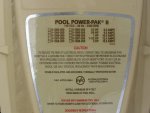I have Doughboy pump P/N0-1087-200, 1.5 hp, 12.4 amps, 3450 RPM. Also a 19" doughboy sand filter 2.0 sq ft and max 50psi. We are installing 160 sq ft of solar panel as I write this. We are still trying to decide if we will have enough pressure or WAY too much pressure on the panels. When the filter is clean, the gage normally reads 15 psi, but I do not really think the gage is accurate. It fills with water every time it rains, and it changes its mind from time to time. I do know that the gage goes to 0 when the pump is off, and it rises as the filter gets dirty, so it is at least giving us the relative info we need, even if it is not numerically correct.
We are using 1.5 inch PVC- mostly sched 40 rigid, with a little flexPVC for funky angles.
The solar panels are rated for a recommended ideal flow of 4gpm per panel with .87 psi head loss. We will have two 4x20 panels hooked in parallel. Their max operating pressure is 45 psi at 80degreesF and max recommended flow is 8 gpm.
So my questions: Do we have enough pump pressure or too much? How close to the ideal 4gpm will we be?
We are building some pressure reliefs into the system in case we are way over, but would like to have some idea how much relief we may need.
NOTE: the panels are not on a roof- they sit on racks on the ground below the water line of the pool.
We are using 1.5 inch PVC- mostly sched 40 rigid, with a little flexPVC for funky angles.
The solar panels are rated for a recommended ideal flow of 4gpm per panel with .87 psi head loss. We will have two 4x20 panels hooked in parallel. Their max operating pressure is 45 psi at 80degreesF and max recommended flow is 8 gpm.
So my questions: Do we have enough pump pressure or too much? How close to the ideal 4gpm will we be?
We are building some pressure reliefs into the system in case we are way over, but would like to have some idea how much relief we may need.
NOTE: the panels are not on a roof- they sit on racks on the ground below the water line of the pool.


